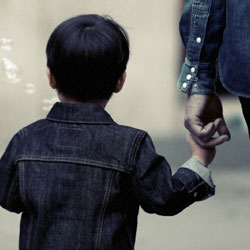What to Know
It's important to keep things as normal as possible after your divorce. Keep meal routines, set rules of behavior, and accepted methods of discipline. Relaxing limits, especially during this time of change, can make your child feel insecure. Don't drop routines and spoil your child in an effort to help her deal with your divorce.
What to Say
Encourage your child to talk about how he feels about your divorce. Try not to downplay his feelings of loss or sadness. Listening and letting him know you understand his feelings will help him through this time of change. Remember to keep your role as a parent, however. Your child is still a child. Don't add to his stress by expecting him to be your friend or to takes sides in any conflict you might have with your ex-spouse. Don't say negative things about your ex-spouse. Don't question your child after he comes back from time with your ex-spouse.
What Not to Do
Avoid these common mistakes.
- Don't be afraid to seek outside help from a counselor or clergy
- Don't forget to take care of yourself
- Don't deprive your child of her favorite toy, blanket, or stuffed animal
- Do not use your child as a messenger. Communicate directly to your ex-spouse
- Do not vent to your child about your spouse
What to Do
Consistency in routine and discipline across both homes are important. Similar ideas about bedtimes, rules, and homework will lower anxiety. Let your child know that you and your ex-spouse are trying to work together to help him deal with the divorce. You might even want to spell out some of these routines in your separation agreement.
The following ideas also can help parents keep a calm, secure household during this change to two households:
- Remain calm in front of your child
- Seek help from family, friends, or a professional counselor
- Rest when your child rests; take care of yourself; make time for your own relaxation
- Maintain warm, safe contacts with your child
- Develop and use a network of friends and family
- Remember - the most important thing you can give your child at this time is your love
- Communicate directly to your ex-spouse
References:
- Centers for Disease Control and Prevention. Births, Marriages, Divorces, and Deaths: Provisional Data for 2001 National Vital Statistics Reports, Vol. 50(14), last referenced 5/8/2003.
- National Network for Child Care. DeBord, K. (1997). Focus on kids: The effects of divorce on children. Raleigh, NC: North Carolina Cooperative Extension Service, last referenced 5/8/2003.
- Divorce Headquarters. Separation Agreements, last referenced 5/8/2003.



